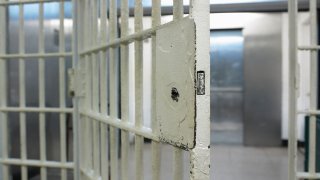
About 3,000 women who are currently incarcerated or were back to 2014 at New Jersey's only women's prison now have about a month to decide if they want to participate in a claim to get a share of a nearly $21 million settlement between the state and plaintiffs over years of sexual abuse at the facility.
The settlement between New Jersey's Department of Corrections, which operates the Edna Mahan Correctional Facility for Women, and the plaintiffs was announced in April. It's separate from the U.S. Department of Justice consent decree announced earlier this week, though both stem from years of abuse of inmates.
The settlement proceedings come as the state attorney general pursues charges against 10 guards in a January attack on inmates, just as the federal consent decree to install an independent monitor was announced and amid Gov. Phil Murphy's plans to shutter the prison because of its history.
A closer look at the what's going on with the settlement:
Get top local stories in Philly delivered to you every morning. Sign up for NBC Philadelphia's News Headlines newsletter.
Why did the state agree to pay out $21 million?
In short, to settle years' worth of claims of sexual abuse and harassment by prison staff against inmates.
What happened? How do we know?
Local
Breaking news and the stories that matter to your neighborhood.
The prison, located in Union Township in Hunterdon County, had what the state attorney general called an “ugly history." An April 2020 U.S. Justice Department report laid it out, concluding that the facility failed to protect inmates from sexual abuse.
Among the things federal investigators found: Five guards and one civilian worker at the prison pleaded guilty or were convicted of sexually abusing more than 10 women from 2016 to 2019.
The report found that there were insufficient cameras, and that one storage room without a surveillance camera had a a mattress lying in it. Guards regularly called prisoners disparaging names, graphically commented on their appearances and remarked on their sexual inclinations.
The report also found that when inmates reported abuse, the response could be retaliatory, with inmates being subjected to body orifice scanners and then being placed into solitary confinement.
Who is eligible to get a payout? How much will they get?
Any woman who was a prisoner at the facility going back to 2014 can qualify for a payout. But there are three tiers laid out in the agreement, each with a different cap on how much a person can get and with varying requirements.
For instance, one tier is for any woman who was imprisoned there from 2014 to present, with a maximum payout of $2,920 — that's $1,000 up front and $20 for every month behind bars. Those payments are expected to go out in January.
Another group of women who were there and who were sexually harassed can receive up to $4,500, though they must also submit an affidavit or corroborating documentation from the time of the harassment.
A third group of women who were victims of sexual abuse can get up to $250,000, though they must submit an affidavit plus corroborating documentation and attend a hearing on the matter.
Then there is a group of about 20 women who initially brought suits against the state and stand to get higher sums, according to the attorneys.
What's the timeline for all this?
It's all happening over the next few months.
Notices went out to current prisoners on July 30, according to records obtained by the Associated Press. The women have until Sept. 14 to decide if they want to opt out, which they may want to do to pursue their own, separate lawsuit against the state.
Separately, anyone who thinks they are entitled to a payout under the agreement must submit a form by Oct. 29. If they don't, they won't get any cash.
A hearing to consider whether the deal is fair is set for Oct. 15.
What's going on with the guards who were charged?
Ten guards have been criminally charged in what the state attorney general called an attack on inmates in which women were forcibly removed from their cells.
An inquiry commissioned by Gov. Phil Murphy found that the cell extractions were a “misguided” attempt to restore discipline after some inmates threw liquids at guards.
Attorneys for the guards have said they plan to fight the charges, which include official misconduct.
A trial is still pending.
What's next for the prison?
Murphy, a Democrat, said he plans to close the prison because of its history, sending inmates to yet-to-be-determined facilities across the state.
But that could take years, Murphy has said, and could require the Legislature to get involved.
On Monday, Murphy said he didn't have any update on what was happening with closing the prison.
The Justice Department this week also announced the consent decree — an agreement between the state and federal prosecutors stemming from findings that inmates' civil rights were violated — will apply to wherever the inmates go after the prison is closed.
Part of that agreement will lead to an independent monitor who will oversee the implementation of new transparency and accountability measures.



